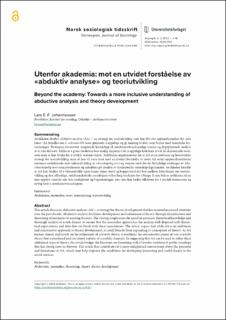Utenfor akademia: mot en utvidet forståelse av «abduktiv analyse» og teoriutvikling
Peer reviewed, Journal article
Published version
Permanent lenke
https://hdl.handle.net/11250/3046687Utgivelsesdato
2022-03-15Metadata
Vis full innførselSamlinger
- Publikasjoner fra Cristin [3269]
- SAM - Institutt for sosialfag [471]
- SPS - Documents [424]
Originalversjon
https://doi.org/10.18261/nost.6.2.4Sammendrag
Artikkelen drøfter abduktiv analyse (AA) – en strategi for teoriutvikling som har fått økt oppmerksomhet det siste tiåret. AA handler om å videreutvikle teori gjennom å oppdage og gi mening til data som bryter med teoretiske forventninger. Strategien forutsetter inngående kjennskap til samfunnsvitenskapelige teorier og dyptpløyende analyse av et rikt datasett. Målet er å gjøre forskeren best mulig disponert for å oppdage fruktbare avvik til eksisterende teori, som man så kan bruke for å utvikle teorien videre. Artikkelen argumenterer for at AA er en ambisiøs og konstruktiv strategi for teoriutvikling, men at den vil være tjent med en utvidet forståelse av teori: AA retter oppmerksomheten nærmest utelukkende mot videreutvikling av vitenskapelig teori og overser med det det betydelige omfanget av ikke-vitenskapelig teori som produseres og sirkuleres på utsiden av tradisjonelle vitenskapelige kanaler. Artikkelen foreslår at AA kan brukes til å videreutvikle også denne typen teori og bygger med det bro mellom litteraturen om teoriutvikling og den offentlige, samfunnskritiske sosiologien vi har lang tradisjon for i Norge. I sum bidrar artikkelen til en mer opplyst samtale om AAs muligheter og begrensninger, noe som kan bedre vilkårene for å utvikle interessant og nyttig teori i samfunnsvitenskapene. This article discusses abductive analysis (AA) – a strategy for theory development that has received increased attention over the past decade. Abductive analysis facilitates development and refinement of theory through identification and theorizing of anomalies to existing theories. The strategy emphasizes the need for extensive theoretical knowledge and thorough analysis of a rich dataset, to ensure that the researcher approaches the analysis well-disposed with theoretical expectations and data that can break with these expectations. The article argues that while AA is an ambitious and constructive approach to theory development, it could benefit from expanding its conception of theory: As AA focuses almost exclusively on the refinement of scientific theory, it overlooks the considerable extent of non-scientific theory that is produced and circulated outside of scientific channels. In suggesting that AA can be used to refine these additional types of theory, the article bridges the literature on theorizing with a broader tradition of public sociology that has strong roots in Norway. The article thus contributes to a more enlightened conversation about the potential and limitations of AA, which may help improve the conditions for developing interesting and useful theory in the social sciences.

